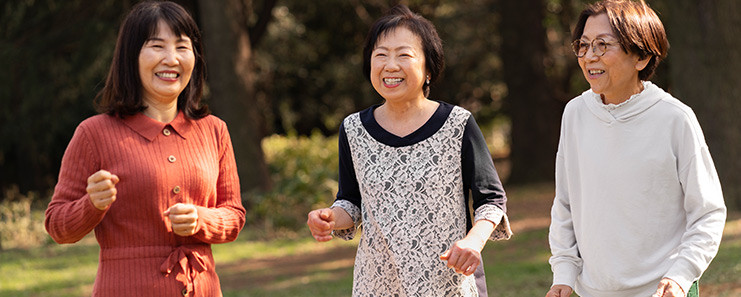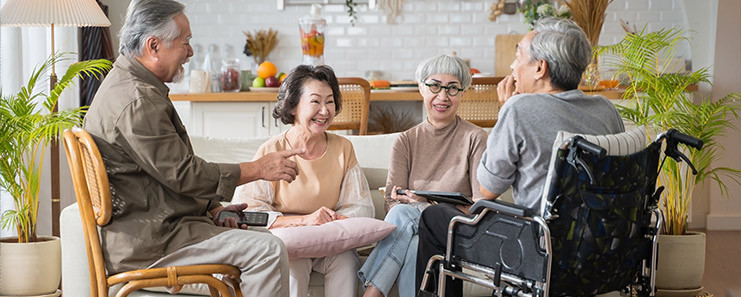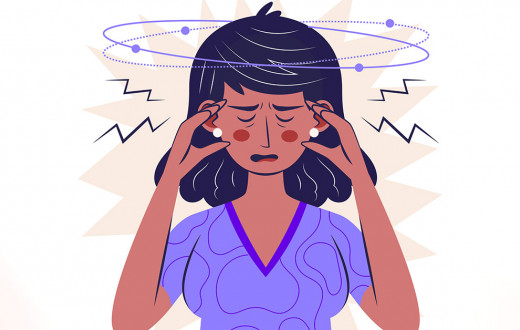In my neighborhood, I often see an old-aged couple basking under the winter sun to get much-needed warmth. The old gentleman, a palsy patient engrossed in his thoughts, seldom replies to my greetings. But the old lady anxiously waits for my words as if I am the first and last one to chat. They live all by themselves. The lady seems to be the only one taking care of her husband. Her physical and mental tiredness reflects in her wrinkled eyes and shaky hands. She may be suffering from caregiver burnout. Let us find ways to help her overcome it.
What is caregiver burnout

Caregiver burnout is a state of physical, emotional and mental exhaustion. It creeps in insidiously and you won’t even know until you find yourself feeling lost both for energy and answers. Answers to how will their dear ones recover from a life-threatening illness, overcome substance abuse or become financially self-sufficient and stop borrowing money?
3 stages of caregiver burnout
There are three stages of caregiver burnout.
First stage: Frustration
You may be frustrated or anxious about your dear one’s declining condition or nil to minimal progress.
Second stage: Feeling of isolation
It makes you feel lonely and unwanted when you struggle at work to provide adequate care to the recipient but are unappreciated or criticized by family members and the care recipient. It results in isolation and withdrawal from social contacts.
Third stage: Feeling of despair
The caregiver starts feeling helpless and culminates in self-blame and despair. There is no excitement for life. The effectiveness of the caregiver diminishes and further adds to the problem. Unfortunately, the negativity that sets in the first two stages becomes a habit in the third stage.
Signs of caregiver burnout
The caregiver burnout stages show these signs.
There is confusion among the family members as one is unsure about their role in assisting the care recipient.
A caregiver comes in with an enormous surety that the cure is waiting to happen with their care. It would be a case of unrealistic expectations that could lead to misery.
Stress could be due to financial restrictions or a lack of resources.
Stress might be caused by stretching oneself (physically and mentally) or a way beyond their capacity.
It’s common for caregivers to be in a state of denial and ignore symptoms of burnout till the situation becomes unbearable.
These are the typical symptoms of caregiver burnout.
Lack of energy
Fatigue and exhaustion
Sleep disorder
Sense of hopelessness and despair
Lack of interest or enthusiasm
Weight loss or weight gain
Resentment
Mood swings, irritability, impatience and anxiety
Headaches, body aches, stomach disorders or pain
Lowered immunity
Suicidal thoughts
How to avoid caregiver burnout

1. In joint families, there was never a worry about who will take care of the elderly or the special abled as all in the family supported each other. The caregiver burnout issue gets a prominent place in society due to the decrease in family size. Instill the concern for parents in children that they are the first ones to look after them in old age. Thus caregiving will continue without burnout.
2. Stop being a perfectionist at times of workload.
3. Refrain from never-ending tasks like deep cleaning your house now and then.
4. Be compassionate with the patient if they don’t feel like exercising as it is better to be happy than to do the exercise with sadness.
5. It is better to share your unspoken feelings politely with the patient rather than surfacing pent-up emotions inappropriately.
6. Ask yourself and pinpoint what exactly is the most challenging part of your role as a caregiver. Don’t involve yourself too much in roles that seem alien to you. Hand over tasks to your other family members.
7. Be alert. Don’t go into denial mode. If your recipient criticizes your ways, remember they are not in their normal condition.
8. Make sure you take adequate rest whenever you can. My aunt gets up on time and helps my uncle do the daily routine but goes for a nap at 11 a.m., which is an odd hour to sleep.

9. Don’t hesitate to reach out for help. The presence of a helper uplifts your energy and spirit to fight back against the problem.
10. Communicate with people you trust. Share your thoughts. Don’t hesitate to ask for advice from the younger generation.
11. Ask for support and specific help, such as a cook to roll chapatis, as you find the task tedious.
12. Draw upon your internal resources. For example, my mother tells me to convince my father on issues related to medicine dosage to avoid the stressful conversation with him.
13. Eat nutritious food to keep yourself fit at all times of need by your recipient.
14. Exercise and/or go for a nature walk.
15. A few minutes of yoga and pranayama will energize you mentally and physically to cope with the uncertainties and challenges associated with caregiving.
16. Meditation is an absolute must and is beneficial for caregivers.
17. If you get an opportunity, take a few days of break to be with Nature.
18. Don’t have false hopes if your patient has a progressive disease and depends on you for their daily routine.
19. Do not forget that your fight is with the disease, ailment or situation, not with the recipient or other people around you.
The Wellness Program is a roadmap designed for a healthy body and mind.
Based on inputs by Dr. Prema Seshadri, Senior International Faculty, The Art of Living
Written by: Pratibha Sharma
Related link
Guided meditation to stop overthinking by Gurudev Sri Sri Ravi Shankar
FAQs on caregiver
- Mix medication from different streams of medicine
- Rely on only home gadgets for tests such as blood pressure and sugar
- Discourage the care recipient from recovery
- Be careless about the time and dosage of giving medicine
“When you meditate, your aura is calm and settled to affect others in the same way,” shares Bhanumathi Narasimhan, senior teacher of the Sahaj Samadhi meditation. A caregiver influences the extent to which a care recipient positively responds to medication and treatment and how they feel about the situation. A stressed caregiver will unknowingly unsettle a patient, whereas a calmer, more peaceful caregiver will radiate that same energy.
Caregiving to a family member gives the satisfaction of giving back the care who cared for you in the past. The happiness that your dear one is getting excellent care and personal attention becomes the purpose of your life. Some caregivers feel satisfied by passing on a tradition of care by modeling caregiving in front of their children. It will be more likely that their children will take care of them if necessary.
Caregiver burnout leads to sleep disorder, changes in appetite, negative emotions and physical and mental loss of control.
Patience, acceptance, alertness, flexibility and dependability.
































